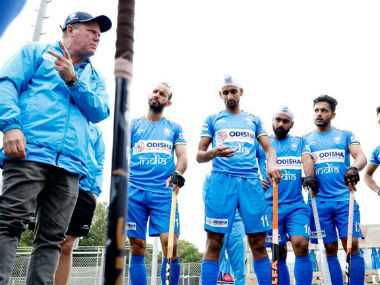Will the Indian men’s and women’s hockey teams play the Tokyo Olympics? It is hard to say. There is confidence they will, but also doubt, especially about the women’s team. The fifth ranked men’s team is thought to be a favourite against 20th-ranked Russia. At the Hockey Series Finals 2019 in Bhubaneswar’s June heat, India defeated Russia 10-0. Russian player Pavel Golubev is respectful of the hosts. “India are one of the best teams in the world, and it’s really interesting and exciting to play against such teams.” In June, Russia’s performance initially was listless, having to suddenly relocate from a cold to a hot environment. They played catch- up hockey, Siegfried Aikman, the Dutch coach of the Japanese men’s team, asserts. Playing at the beginning of the season was hard, and Russia got better as the tournament progressed. The 10-0 scoreline was flattering for India. [caption id=“attachment_7580841” align=“alignleft” width=“380”] Indian men will be up against Russia in Bhubaneswar. Image: Twitter/ @TheHockeyIndia[/caption] At the Olympics qualifiers, Russia will be playing in a more comfortable season, and with as much hunger as India. When two teams push themselves, results can upset rankings. “We want to make sure that we are playing at our best, and there will be no complacency. It does not matter who we play, we will approach the game in the same manner, that is, in a professional and respectful way,” India’s coach Graham Reid told PTI. Russia’s record against India shows a far from one-sided rivalry. According to hockey statistician BG Joshi, up to 1991, the former USSR and India had played 22 games, each side winning eight, and six ending in draws. India, however, have won the last five games, scoring 30 goals and conceding seven. Even with India’s steady improvement, underestimating Russia would be perilous. The women’s team’s record against the USA, though, is not encouraging. The US have won 16 of 29 games, losing four, and drawing nine. India have lost all four games to the US at the Olympics, World Cup, and World League. In the last three years, the US continue to have the edge, winning three of five games (3-2 in the 2016 Citi Rio Send-Off series in Lancaster, 3-0 in the 2016 Rio Olympics and 4-1 in the 2017 FIH World League semi finals at Johannesburg). At Lancaster, the US lost a game 1-2, and drew the most recent game at the 2018 London World Cup 1-1. Statistically, India’s women’s team is improving. In the last few years, they play the hustle more comfortably, and fitter players give back what they get. The new approach generates pace, India’s team management thinks. Janneke Schopman, the US head coach, said, “India are a challenging opponent that has made a lot of strides in the past few years. They have a good goalkeeper and a threatening attack. Playing them in front of their home crowd will be an experience we have to be ready for.” India’s recent performances raise hope. In a series against Great Britain a few weeks ago, the two teams won one game each, drawing the remaining three. “We were better in three-and-a-half games out of five. In the last game, Great Britain scored with 20 seconds remaining. Being a home series, they had a larger pool of players than India,” Sjoerd Marijne, India’s coach, says. He is right that Britain had the fresh legs to maintain high energy levels. But, it is worth considering that a full-strength India were playing a developmental British team. Had Britain fielded their best players, it is hard to assess what the result might have been. With a tough draw, upstaging the US with a decidedly better record, would be a small piece of history. The men’s team’s build-up to the qualifiers has been good. At the same time that the women were touring Britain, the men’s team played five away games in test series against Spain and Belgium, winning all of them. India, improbably, defeated Belgium 5-1 in the last game, but the world champions had fielded their B team against the best Indian team. India’s victory, thus, should be taken with a pinch of salt. This flawed approach, the emphasis on the outcome at the cost of the process, is endemic to Indian hockey, and sport in general. This explains why, historically, India have done well against developmental teams in bilateral series, yet faced serial defeats to full-strength teams in multilateral tournaments. While other nations use bilateral series to test new players and tactics, India rarely experiments, fearing it will lose. This creates an illusion of prowess, but does little for development. The Olympics qualifiers will be vastly different from a bilateral series. India’s so-called home advantage actually works against them. Spectators get carried away when home players move in the opposition half, and this encourages the players to continue running, lowering energy levels. The noise sometimes makes players surge forward phantom-like, playing to the gallery, and not according to the situation. Spectators can’t be allowed to dictate play. In the quarter-finals of the 2018 World Cup, the Netherlands played a smart game, while the Indians played at the full press, cheered along by a well-meaning crowd, unable to comprehend the Netherlands’ tactic of slowing down the game to gain control. India’s defeat in that game shows home advantage is no advantage, even with the luck of the draw. Be careful, India. Jitendra Nath Misra is a former ambassador. He advises the government of Odisha on sports and teaches at Jamia Millia Islamia University, New Delhi.
India’s men have won their last five games against Russia, scoring 30 goals and conceding seven. The women’s team’s record against the USA, though, is not encouraging. The US have won 16 of 29 games, losing four, and drawing nine.
Advertisement
End of Article


)

)
)
)
)
)
)
)
)



